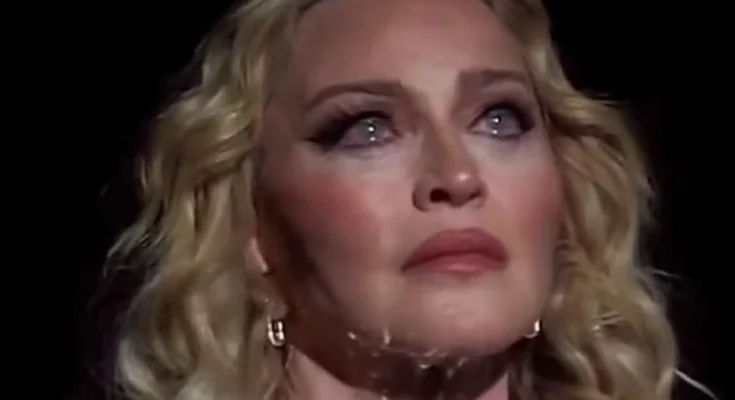In 2025, Madonna released a remix album titled Veronica Electronica, officially out on July 25 via Warner Records. (Pitchfork)
- The material comes primarily from her landmark 1998 album Ray of Light. The remixed or reworked tracks include versions by William Orbit, Peter Rauhofer, Sasha, BT, and Victor Calderone, among others. (Pitchfork)
- Also included is a previously unreleased demo, “Gone, Gone, Gone”, produced with Rick Nowels. (Exclaim!)
- The album was originally conceived back in the Ray of Light era, intended as a companion remix collection. That project was shelved because the original album’s success consumed much of the attention and resources. (Exclaim!)
So far, in terms of concept, Veronica Electronica is not merely a greatest‑hits compilation; it’s about revisiting and reimagining Ray of Light’s material, with a framing via an alter ego (“Veronica Electronica”) that Madonna has referred to in interviews as part of the artistic identity she adopted around that period. (People.com)
Why Ray of Light is Sacred to Many
To understand the backlash, we need to restate what Ray of Light represents:
- When Ray of Light came out in 1998, it marked a transformation in Madonna’s artistry. It wove in electronic, ambient, trip‑hop, more contemplative lyrics on motherhood, spirituality, introspection. (Wikipedia)
- It won multiple Grammy Awards, sold millions of copies (over 16 million globally), and is widely considered one of her career high points. (Wikipedia)
- For fans, Ray of Light is not just an album, but a cultural touchstone: a defining moment in pop/electronic crossover, and deeply tied to Madonna’s personal evolution. (The Independent)
Because of this legacy, revisiting it (especially via remixes or reworks) raises stakes. Any new project that touches Ray of Light is automatically compared with that emotional, creative high watermark.
The Nature of the Backlash
Although Veronica Electronica has many defenders, criticisms have emerged across fan forums, among critics, and in media commentary. The backlash centers on several key concerns:
- Titling Confusion / Legacy Dilution
Some fans believe using the name Ray of Light so prominently in a remix context under a new persona (“Veronica Electronica”) blurs the line between the original album and this reinterpretation. The concern is that it may lessen the uniqueness or “sacredness” of the original. Some feel the new project should have more clearly separated itself from Ray of Light (e.g. subtitle “Remixed”, “Revisited”). - Artistic vs. Commercial Motives
Critics question whether Veronica Electronica is being released as a sincere artistic statement, or more as a way to monetize nostalgia. Given the 25+ year distance from the original, and that many of the remixes were already heard in some form (on single releases or bootlegs), some feel that there’s less new content than promised. (Wikipedia) - Quality & Cohesion of Remixes
While some tracks are being praised (e.g. “Frozen”, “Drowned World/Substitute for Love” remixes, demos) for their creativity, others are seen as weaker or feeling like filler. Some remixes are criticized for feeling disconnected from what made the original songs powerful. The emotional or spiritual depth many associate with Ray of Light is said to be diminished in more club/dance‑oriented versions. (The Guardian) - Use of the Alter Ego “Veronica Electronica”
The persona has been embraced by Madonna, but some feel it is a contrived or retro gimmick — or that it doesn’t add much to the work except perhaps marketing intrigue. The alias had been floated in rumors for decades; now that it’s official, there are questions about whether it’s meaningful or mainly symbolic. (People.com) - Timing and How Much is Actually “New”
Because many remixes are re‑edits, restored or reconfigured versions of known remixes, there is disappointment among fans seeking truly unheard work. While the demo “Gone, Gone, Gone” is new, it seems to be the only mostly fresh track. Some believe the project could have delivered more depth if Madonna and her collaborators had opened up more from the vaults. (BreatheHeavy | Exhale)
Critical Reception & Fan Response
- Critics have been mixed to positive. Some reviews praise the reimagined versions for shedding light (no pun intended) on Madonna’s creative process in the Ray of Light era, the ways the music holds up and influences artists today. (The Guardian)
- Other reviews, while recognizing the nostalgic value, note that the album is uneven: some remixes are brilliant and transformative; others feel like safe rehashes. (The Guardian)
- Among fans, there is a strong division. A segment applauds Madonna for revisiting such a beloved album with respect, offering rare tracks, giving longtime fans something they’ve wanted. Others feel let down — that Veronica Electronica doesn’t fully honour the emotional resonance of Ray of Light, or that its framing asks too much of nostalgia without enough new substance. Social media threads and fan forums reflect disappointment, especially from those who expected more “lost tracks” rather than remixes.
Madonna’s Perspective
- Madonna herself has addressed that Veronica Electronica is a part of her artistic identity, rooted in what she was exploring in the late 1990s: electronic music, spiritual/introspective themes, transformation. (People.com)
- She’s positioned the album not as a replacement of Ray of Light, but rather a companion and extension: a chance to revisit that era through the lens of remixing and reinterpretation. The demo track “Gone, Gone, Gone” and the remixes are the open window into what might have been in that period had resources/dialogue favored a remix album. (Exclaim!)
Broader Implications: Nostalgia, Legacy & Creative Ownership
The backlash isn’t unique to Madonna: many artists who have seminal works face similar challenges when revisiting, remixing, or reissuing. Some broader questions here include:
- How do you revisit past work without diminishing it? The balancing act between honoring original art and keeping it relevant or fresh is delicate.
- What rights do fans have to expect new material vs. reworks? Especially when an artist’s past is deeply beloved, fans often hope for lost songs, unheard demos, more than reimaginings.
- What role does marketing play in framing these returns? Alter egos, reissues, deluxe versions – how much is artistic vision vs. business strategy?
Is the Backlash Justified?
In many ways, yes — especially from the standpoint of fan expectations. Ray of Light was not only commercially huge, but deeply meaningful to many listeners. When you promise something tied to it, fans expect reverence, clarity, and something more than repackaging.
However, there is also a counter‐argument: art evolves, and revisiting one’s past is legitimate. Many artists re‑contextualize older work through remixes, reinterpretations, or new collaborations. If the intention is honest, even imperfect versions can be valuable.
Veronica Electronica appears to straddle both sides: offering rare and unreleased material (demo, remixes) while also capitalizing on nostalgia. The degree to which it pulses with fresh creative energy depends on individual listener expectations.
Final Thoughts
Madonna’s Veronica Electronica is significant — both as a piece of her discography and in terms of how we think about legacy, nostalgia, and artistic interpretation. The backlash underscores how deeply Ray of Light matters to fans, but also illuminates how tricky it is to rework something so iconic without displeasing some portion of the audience.
In many ways, this is an example of what happens when art accumulates myth. Once a work reaches a mythic status (as Ray of Light has), any sequel or revisit is going to be measured against that myth.
If you like, I can contrast this with similar remix/reissue controversies (e.g. Prince, Björk, etc.), or explore what fans are specifically saying in different regions. Do you want me to do that?



